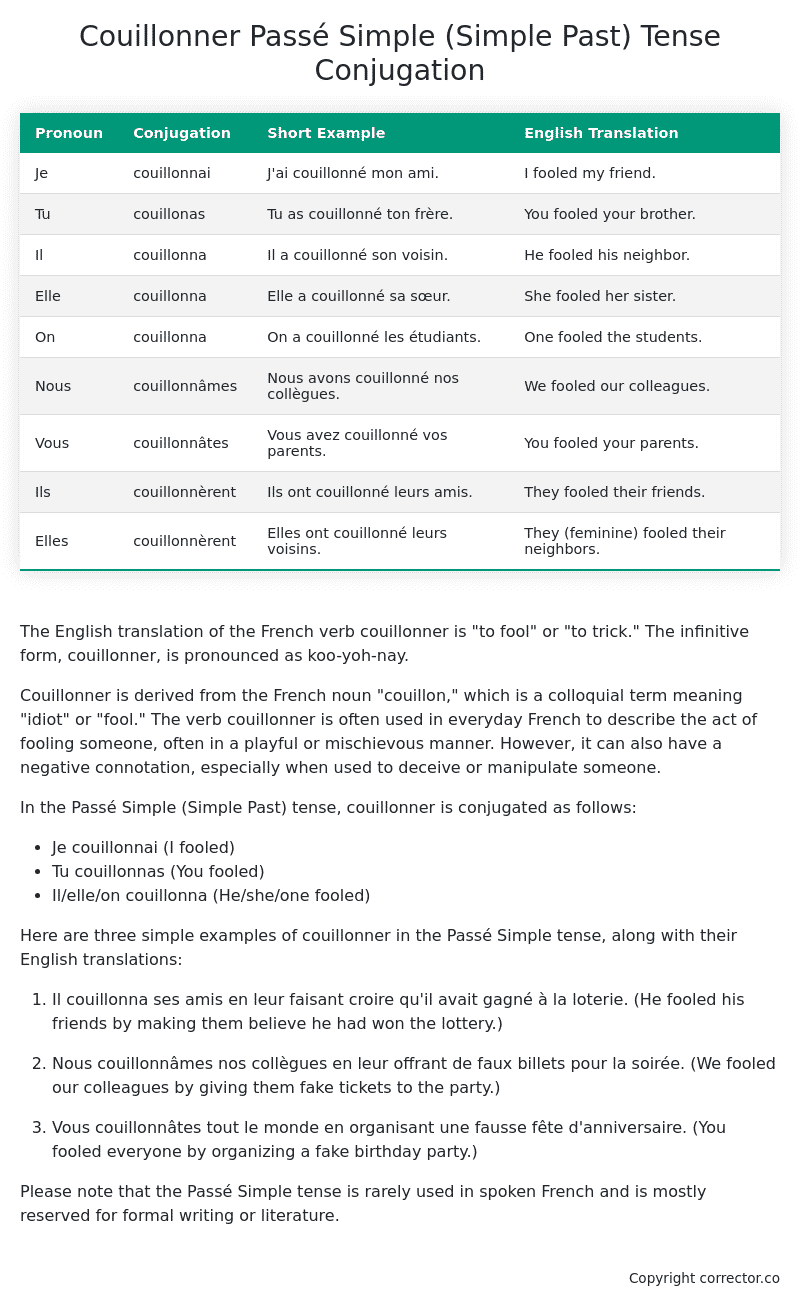Passé Simple (Simple Past) Tense Conjugation of the French Verb couillonner
Introduction to the verb couillonner
The English translation of the French verb couillonner is “to fool” or “to trick.” The infinitive form, couillonner, is pronounced as koo-yoh-nay.
Couillonner is derived from the French noun “couillon,” which is a colloquial term meaning “idiot” or “fool.” The verb couillonner is often used in everyday French to describe the act of fooling someone, often in a playful or mischievous manner. However, it can also have a negative connotation, especially when used to deceive or manipulate someone.
In the Passé Simple (Simple Past) tense, couillonner is conjugated as follows:
- Je couillonnai (I fooled)
- Tu couillonnas (You fooled)
- Il/elle/on couillonna (He/she/one fooled)
Here are three simple examples of couillonner in the Passé Simple tense, along with their English translations:
-
Il couillonna ses amis en leur faisant croire qu’il avait gagné à la loterie.
(He fooled his friends by making them believe he had won the lottery.) -
Nous couillonnâmes nos collègues en leur offrant de faux billets pour la soirée.
(We fooled our colleagues by giving them fake tickets to the party.) -
Vous couillonnâtes tout le monde en organisant une fausse fête d’anniversaire.
(You fooled everyone by organizing a fake birthday party.)
Please note that the Passé Simple tense is rarely used in spoken French and is mostly reserved for formal writing or literature.
Table of the Passé Simple (Simple Past) Tense Conjugation of couillonner
| Pronoun | Conjugation | Short Example | English Translation |
|---|---|---|---|
| Je | couillonnai | J’ai couillonné mon ami. | I fooled my friend. |
| Tu | couillonas | Tu as couillonné ton frère. | You fooled your brother. |
| Il | couillonna | Il a couillonné son voisin. | He fooled his neighbor. |
| Elle | couillonna | Elle a couillonné sa sœur. | She fooled her sister. |
| On | couillonna | On a couillonné les étudiants. | One fooled the students. |
| Nous | couillonnâmes | Nous avons couillonné nos collègues. | We fooled our colleagues. |
| Vous | couillonnâtes | Vous avez couillonné vos parents. | You fooled your parents. |
| Ils | couillonnèrent | Ils ont couillonné leurs amis. | They fooled their friends. |
| Elles | couillonnèrent | Elles ont couillonné leurs voisins. | They (feminine) fooled their neighbors. |
Other Conjugations for Couillonner.
Le Present (Present Tense) Conjugation of the French Verb couillonner
Imparfait (Imperfect) Tense Conjugation of the French Verb couillonner
Passé Simple (Simple Past) Tense Conjugation of the French Verb couillonner (You’re reading it right now!)
Passé Composé (Present Perfect) Tense Conjugation of the French Verb couillonner
Futur Simple (Simple Future) Tense Conjugation of the French Verb couillonner
Futur Proche (Near Future) Tense Conjugation of the French Verb couillonner
Plus-que-parfait (Pluperfect) Tense Conjugation of the French Verb couillonner
Passé Antérieur (Past Anterior) Tense Conjugation of the French Verb couillonner
Futur Antérieur (Future Anterior) Tense Conjugation of the French Verb couillonner
Subjonctif Présent (Subjunctive Present) Tense Conjugation of the French Verb couillonner
Subjonctif Passé (Subjunctive Past) Tense Conjugation of the French Verb couillonner
Subjonctif Imparfait (Subjunctive Imperfect) Tense Conjugation of the French Verb couillonner
Conditionnel Présent (Conditional Present) Tense Conjugation of the French Verb couillonner
Conditionnel Passé (Conditional Past) Tense Conjugation of the French Verb couillonner
Conditionnel Passé II (Conditional Past II) Tense Conjugation of the French Verb couillonner
L’impératif Présent (Imperative Present) Tense Conjugation of the French Verb couillonner
L’impératif Passé (Imperative Past) Tense Conjugation of the French Verb couillonner
L’infinitif Présent (Infinitive Present) Tense Conjugation of the French Verb couillonner
L’infinitif Passé (Infinitive Past) Tense Conjugation of the French Verb couillonner
Le Participe Présent (Present Participle) Tense Conjugation of the French Verb couillonner
Le Participe Passé (Past Participle) Tense Conjugation of the French Verb couillonner
Struggling with French verbs or the language in general? Why not use our free French Grammar Checker – no registration required!
Get a FREE Download Study Sheet of this Conjugation 🔥
Simply right click the image below, click “save image” and get your free reference for the couillonner Passé Simple tense conjugation!

Couillonner – About the French Passé Simple (Simple Past) Tense
Formation
Usage
Narration
Historical Context
Interactions with other tenses
Passé Composé
Imparfait
Conditional and Subjunctive
Summary
I hope you enjoyed this article on the verb couillonner. Still in a learning mood? Check out another TOTALLY random French verb conjugation!


